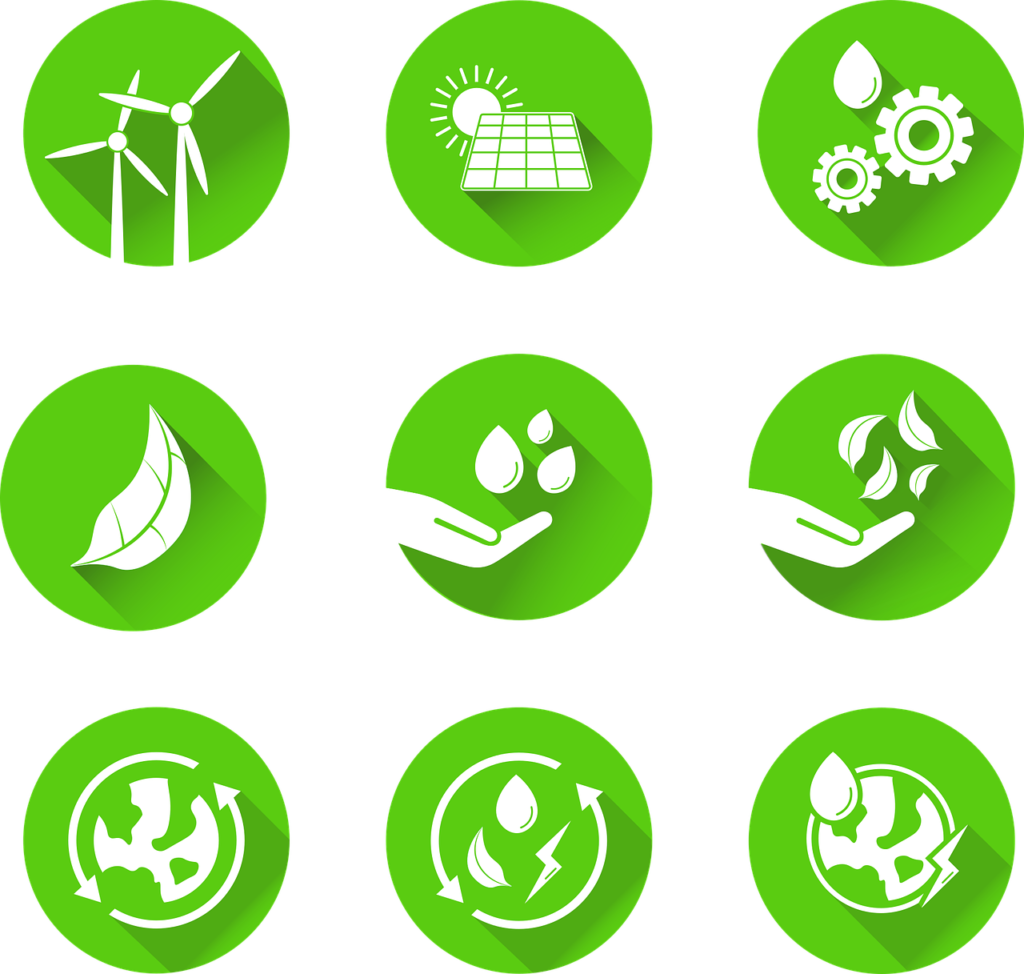In today’s ever-evolving world, sustainability has become a paramount concern for both businesses and consumers. The concern for the environment and society has sparked a wave of innovative and eco-friendly practices that are being adopted by companies and individuals alike. From utilizing renewable energy sources to embracing zero-waste initiatives, there seems to be a rising trend towards incorporating sustainable practices into everyday operations. This article explores the various new sustainable practices that businesses and consumers are adopting, highlighting their positive impact on the planet and society.

This image is property of pixabay.com.
1. Sustainable Practices in Business
1.1 Green Supply Chain Management
In an effort to reduce their environmental impact and promote sustainability, businesses are increasingly turning to green supply chain management practices. This involves integrating environmentally friendly processes and materials throughout the entire supply chain, from sourcing raw materials to the delivery of the final product. By carefully selecting suppliers who adhere to sustainable practices, businesses can ensure that their products are produced with minimal harm to the environment. Green supply chain management also involves optimizing transportation routes to reduce fuel consumption and emissions, as well as implementing waste reduction and recycling initiatives within the supply chain.
1.2 Circular Economy
The concept of a circular economy is gaining traction among businesses aiming to minimize waste and maximize resource efficiency. Unlike the traditional linear economy, which follows a “take-make-dispose” model, the circular economy focuses on designing products and systems with a goal of keeping materials in use for as long as possible. This involves strategies such as recycling, reusing, and repurposing materials and products. By embracing the principles of the circular economy, businesses can reduce their reliance on finite resources and contribute to a more sustainable future.
1.3 Renewable Energy Adoption
In an era of increasing concern about climate change and fossil fuel depletion, many businesses are adopting renewable energy sources as a sustainable alternative. Investing in solar panels, wind turbines, and other renewable energy technologies allows businesses to generate clean and renewable electricity to power their operations. By shifting to renewable energy adoption, businesses not only reduce their carbon footprint but also benefit from potential cost savings and energy independence in the long run.
1.4 Sustainable Packaging
To address the issue of excessive packaging waste, businesses are embracing sustainable packaging practices. This includes using environmentally friendly materials, such as biodegradable or compostable packaging, as well as minimizing packaging size and weight. Sustainable packaging focuses on reducing the use of single-use plastic and transitioning towards more sustainable alternatives. By adopting sustainable packaging practices, businesses can contribute to waste reduction efforts and meet the increasing consumer demand for eco-friendly products.
1.5 Ethical Sourcing
Ethical sourcing has become a priority for many businesses as consumers increasingly demand transparency and responsible practices in the supply chain. This involves ensuring that raw materials and ingredients are sourced from suppliers who adhere to fair labor practices, human rights standards, and environmental regulations. By actively engaging in ethical sourcing, businesses can demonstrate their commitment to social and environmental sustainability, build trust with consumers, and support the well-being of workers and communities involved in the production process.
1.6 Carbon Offset Programs
To mitigate their carbon emissions and contribute to the fight against climate change, businesses are participating in carbon offset programs. These programs allow businesses to invest in projects that reduce greenhouse gas emissions or remove carbon dioxide from the atmosphere. Common carbon offset initiatives include reforestation projects, renewable energy development, and methane capture projects. By participating in carbon offset programs, businesses can compensate for their carbon footprint and take tangible steps towards a more sustainable future.
1.7 Eco-friendly Transportation
Businesses are increasingly exploring eco-friendly transportation options to reduce their environmental impact. This includes investing in electric or hybrid vehicles for their fleets, promoting public transportation alternatives for employees, and implementing telecommuting or remote work policies to minimize commuting-related emissions. By adopting eco-friendly transportation practices, businesses can contribute to air quality improvement, reduce reliance on fossil fuels, and demonstrate their commitment to sustainable mobility.
1.8 Waste Management and Recycling
Efficient waste management and recycling practices are essential for businesses aiming to minimize their impact on the environment. This involves implementing proper waste segregation systems, encouraging employees to reduce waste generation, and partnering with recycling facilities to ensure that materials are recycled properly. By prioritizing waste management and recycling, businesses can divert significant amounts of waste from landfills, conserve resources, and contribute to the transition towards a circular economy.
1.9 Water Conservation Measures
With water scarcity becoming an increasingly pressing issue globally, businesses are implementing water conservation measures to ensure the responsible use of this vital resource. This includes investing in water-efficient technologies and equipment, implementing leak detection systems, promoting water-saving practices among employees, and recycling or reusing water wherever possible. By prioritizing water conservation, businesses can reduce their water footprint, support sustainable water management, and contribute to the preservation of freshwater ecosystems.
1.10 Employee Engagement in Sustainability
Recognizing the importance of employee involvement in sustainability efforts, businesses are actively engaging their workforce in sustainable practices. This can include providing sustainability training and education, establishing employee-led sustainability committees, and encouraging employee participation in sustainability initiatives. By fostering a culture of sustainability within the organization, businesses can tap into the creativity and commitment of their employees to drive positive change and achieve their sustainability goals.
2. Sustainable Practices by Consumers
2.1 Responsible Consumption
Consumers play a crucial role in promoting sustainability by making responsible choices when it comes to their purchases. This involves considering the environmental and social impact of products and opting for sustainable alternatives whenever possible. Responsible consumption can include choosing products with minimal packaging, supporting brands that prioritize sustainability, and avoiding products derived from endangered species or produced in unethical conditions. By practicing responsible consumption, consumers can exert their purchasing power to influence businesses towards more sustainable practices.
2.2 Energy-efficient Appliances
One of the most impactful ways consumers can contribute to sustainability is by investing in energy-efficient appliances for their homes. Energy-efficient appliances, such as refrigerators, washing machines, and air conditioners, are designed to consume less energy while providing the same level of functionality. By replacing outdated and energy-intensive appliances with more efficient models, consumers can reduce their carbon footprint and lower their energy bills over time.
2.3 Eco-friendly Transportation Choices
Consumers have the power to make sustainable transportation choices that reduce their environmental impact. This can include opting for public transportation, carpooling, cycling, or walking instead of relying solely on private vehicles. Additionally, choosing electric or hybrid vehicles can significantly reduce carbon emissions associated with transportation. By making eco-friendly transportation choices, consumers can contribute to reduced traffic congestion and air pollution, while promoting sustainable mobility options in their communities.
2.4 Ethical and Fair Trade Purchasing
Consumers are increasingly prioritizing ethical and fair trade purchasing to ensure that the products they buy are produced under fair labor conditions. Fair trade certification ensures that producers receive fair compensation for their goods, and that workers are not exploited or subjected to unsafe working conditions. By choosing products with fair trade certifications and supporting brands that prioritize ethical sourcing, consumers can promote social justice and contribute to the improvement of workers’ livelihoods around the world.
2.5 Minimalism and Decluttering
Embracing a minimalist lifestyle and practicing decluttering can significantly contribute to sustainability. By reducing the amount of stuff we own and consume, consumers can minimize resource extraction, reduce waste generation, and lessen their impact on the environment. Minimalism encourages thoughtful and intentional consumption, focusing on quality over quantity, and prioritizing experiences over material possessions. By adopting minimalism and decluttering, consumers can enhance their well-being while living in harmony with the planet.
2.6 Sustainable Food Choices
Consumers can make sustainable food choices by opting for locally sourced, organic, and seasonal produce. Supporting local farmers and purchasing organic food helps reduce the use of pesticides and synthetic fertilizers, protecting both human health and the environment. Furthermore, choosing plant-based options and reducing meat consumption has significant environmental benefits, such as reducing greenhouse gas emissions and land degradation associated with animal agriculture. By making sustainable food choices, consumers can contribute to a more sustainable and resilient food system.
2.7 Recycling and Waste Reduction
Recycling and waste reduction are fundamental practices for consumers to reduce their environmental impact. Properly sorting and recycling materials, such as paper, glass, plastic, and metal, diverts waste from landfills and conserves resources. Consumers can also minimize waste generation by opting for reusable products, such as water bottles, shopping bags, and coffee cups. By embracing recycling and waste reduction, consumers can play an active role in the circular economy and contribute to the conservation of natural resources.
2.8 Water Conservation at Home
Water scarcity is a growing concern, making water conservation at home crucial. Consumers can adopt water-saving habits, such as taking shorter showers, fixing leaks, and installing water-efficient fixtures. Collecting rainwater for gardening or using gray water for non-potable purposes are additional ways to conserve water. By practicing water conservation at home, consumers can help alleviate pressure on freshwater sources and contribute to the sustainable management of this vital resource.
2.9 Community Engagement in Sustainability
Community engagement is an essential aspect of sustainability, and consumers can actively participate in local sustainability initiatives. This can involve volunteering for environmental organizations, participating in local clean-up events, and supporting community gardens and sustainable food projects. By engaging in sustainability at the community level, consumers can create positive environmental and social impacts while inspiring others to take action.
2.10 Adoption of Renewable Energy Sources
With the increasing availability and affordability of renewable energy options, consumers can contribute to sustainability by adopting renewable energy sources in their homes. Installing solar panels or purchasing energy from renewable sources allows consumers to reduce their reliance on fossil fuels and support the transition towards a clean energy future. By embracing renewable energy sources, consumers can lower their carbon footprint and inspire others to follow suit.
In conclusion, sustainable practices are being adopted both by businesses and consumers alike. Whether it’s implementing green supply chain management, embracing a circular economy, adopting renewable energy sources, or making responsible consumption choices, these practices have the potential to create a significant positive impact on the environment and society as a whole. By working together, businesses and consumers can drive the shift towards a more sustainable future.

This image is property of pixabay.com.

Welcome to Triple Star News! I am your Editor, your go-to source for staying informed and up to date on a wide array of themes and topics. My dedicated team of journalists and reporters works tirelessly to bring you timely and comprehensive news coverage that caters to your diverse interests and curiosities. From current events and politics to technology, entertainment, health, and beyond, I’ve got you covered. I pride myself on delivering information in a clear, concise, and engaging manner, accessible to readers of all backgrounds. Join me on Triple Star News and embark on a journey of discovery, staying informed, and expanding your horizons. Let the world unfold before your eyes.


